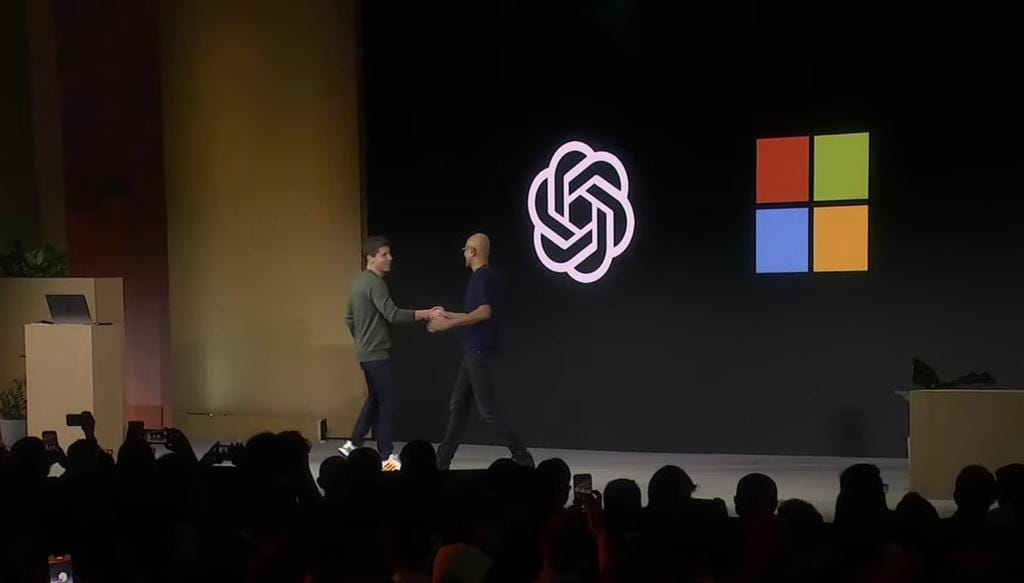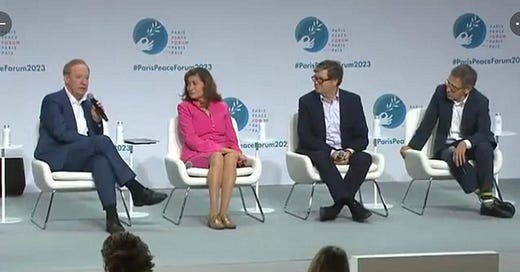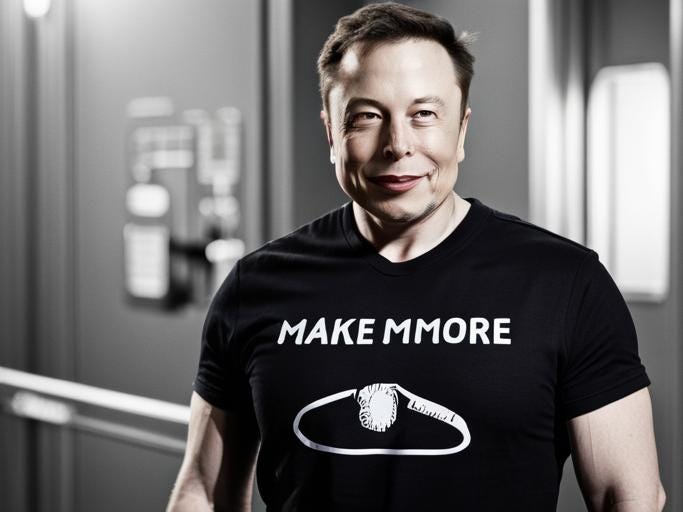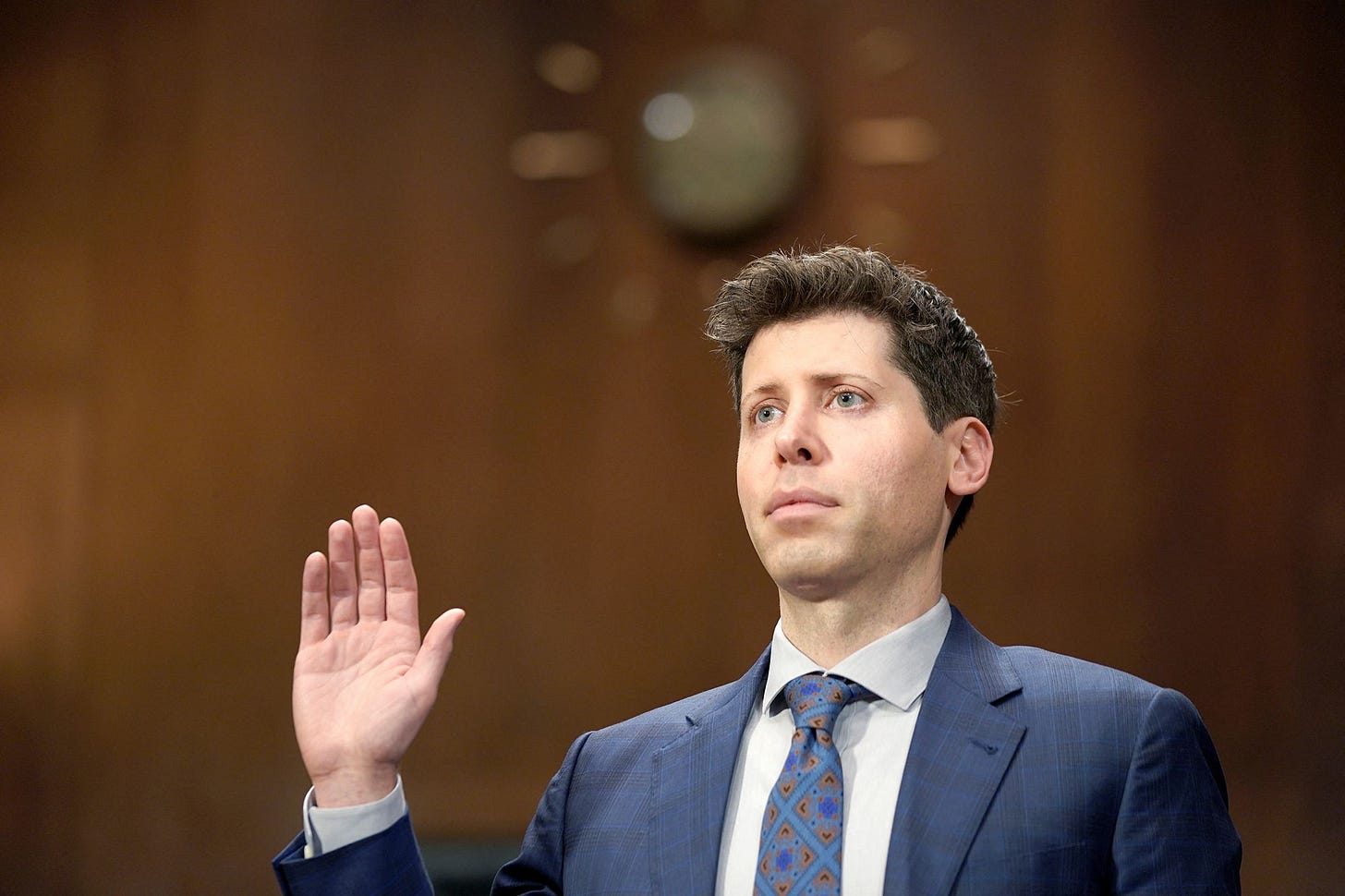Microsoft-Meta AI Slugfest at the Paris "Peace" Forum 2023
On-stage remarks by Brad Smith, President Microsoft and the Conference Vice Chair triggered a controversy and sparked a debate on X.

Brad Smith's Provocative Statement
On-stage remarks by Brad Smith, President of Microsoft and Vice Chair of the 2023 Paris Peace Forum on Saturday, November 10, triggered a huge controversy and ignited a widespread debate within the tech community. Addressing the audience, Smith raised a pointed question: "Meta is owned by shareholders. OpenAI is owned by a non-profit. Which would you have more confidence in? Getting your technology from a non-profit or a for-profit company that is entirely controlled by one human being?" This bold statement not only targeted Meta's approach to AI development but also fueled a broader discussion on the dynamics of trust and ethics in the realm of AI, highlighting the complex interplay between corporate interests and technological advancement.
Yann LeCun's Stand for Open-Source AI at Meta
In the context of Brad Smith's remarks at the 2023 Paris Peace Forum, the strong advocacy for open-source AI by Meta's Chief AI Scientist, Yann LeCun, stood in stark contrast. Recognized globally for his groundbreaking contributions to artificial intelligence, particularly in the development of convolutional neural networks, LeCun's voice has been a pivotal one in the discourse surrounding AI's future. His stance, advocating for AI technology to be as open and community-oriented as platforms like Wikipedia, presents a clear divergence from Microsoft's predominantly 'closed source' approach to product development. This advocacy not only underscores his commitment to open-source principles but also highlights the differing philosophies within the tech industry regarding AI advancement.
Reacting to Smith's assertions, LeCun took to Twitter1 and referred to the conference's YouTube channel2 to articulate his position. He expressed surprise at Smith's claim that "Llama isn't open because Meta is controlled by one person while OpenAI is trustworthy because it is owned by a non-profit." LeCun's vision for AI's future, which reflects his personal perspective rather than Meta's official stance, centers on the concept of AI assistants as a universal infrastructure. This infrastructure, he envisions, would encapsulate the full spectrum of human culture and knowledge. To realize this ambitious vision, LeCun asserts the necessity of an open-source development model. He emphasizes the importance of transparency and collective participation in advancing AI technologies, highlighting the need for a collaborative approach in shaping AI's role in society. This perspective underlines the essential role of openness and inclusivity in the evolution of AI, according to LeCun's forward-thinking viewpoint.

The Irony in Microsoft's Investment in OpenAI
Brad Smith's comments at the Paris Peace Forum highlighted an apparent paradox in Microsoft's strategy. Despite Microsoft's considerable investment in OpenAI, estimated at $10 billion as of January 2023, there are nuanced terms to this financial engagement. This investment, contributing to a funding round that pegged OpenAI's valuation at $29 billion, indicates more than just a casual financial interest.
Extracting more than a pound of flesh
According to a CNBC report, the deal stipulates that Microsoft will initially receive 75% of OpenAI's profits, a condition that remains until Microsoft recuperates its initial investment. Subsequently, Microsoft is set to assume a significant 49% stake in OpenAI. This arrangement, while ostensibly supporting a non-profit organization, raises profound questions about the evolving nature of OpenAI's operational model, shifting from its original non-profit ethos to a structure that appears more aligned with profit-driven motives.
How could a “non-profit” generate humongous wealth for Microsoft?
A report by Barron's has further speculated on the potential value of this deal, suggesting that Microsoft's 49% stake in OpenAI could escalate to an estimated worth of $100 billion. This projection, if realized, would mark a significant milestone in the corporate and financial landscape of AI development, underscoring the complex and often contradictory nature of large-scale corporate investments in seemingly non-profit AI ventures.
Elon Musk's Prescient Standpoint
Elon Musk, co-founder of OpenAI, had articulated his disappointment as early as on February 17, 2023. He regretted the shift of OpenAI from its original mission, stating, "OpenAI was created as an open source, non-profit company... but now it has become a closed source, maximum-profit company effectively controlled by Microsoft. Not what I intended at all." Musk's statement added depth to the ongoing debate, showcasing a divergent path from OpenAI's founding principles.
The Community's Reaction on Twitter
The response from the tech community on Twitter to Brad Smith's remarks was immediate and intense. Users were quick to point out the contradictions in Smith's statements, with many accusing Microsoft of misrepresentation and misleading comparisons between Meta and OpenAI. These reactions went beyond simple criticism; some commentators accused Smith of "gaslighting," a term used to describe manipulative behavior intended to make others question their own perceptions or beliefs.3
This flurry of activity on the platform underscored the deep-seated tension between corporate influence in the AI industry and the foundational principles of open-source development. Twitter users highlighted how Smith's assertions seemed to gloss over the complexities of OpenAI's transition towards a de facto profit-oriented model, despite its roots as a non-profit organization. The discussions brought to light concerns about the integrity of corporate narratives in AI development, questioning the potential impact of such large-scale investments on the future direction and accessibility of AI technologies. In essence, this vociferous reaction on social media reflected broader apprehensions within the tech community about the evolving dynamics of power, control, and ethics in the rapidly advancing field of artificial intelligence.
Our Perspective: The Ethics and Integrity in AI Development
The animated discussions at the Paris Peace Forum serve as a crucial reminder of the intricate balance that must be struck in the realm of AI development. The contrasting positions of Microsoft and Meta, along with the evolving nature of OpenAI, exemplify the challenging interplay between profit motivations and the principles of open-source development. This dialogue is not just about corporate strategy but touches upon the very ethics and integrity that should underpin advancements in AI, as underscored by independent experts like Yann LeCun.
The Achievements of OpenAI and ChatGPT are Commendable
While it is undeniable that OpenAI, with Microsoft's backing, has made significant strides in evolving AI technologies, notably in the progression from ChatGPT4 to ChatGPT4 Turbo, the manner in which these achievements are communicated and represented holds equal importance. Brad Smith's remarks, as a senior executive of Microsoft and the Vice Chair of the Paris Forum, have been criticized for potentially misleading the public. Such statements, seen as veering towards misrepresentation or even falsehoods, raise serious concerns about the transparency and honesty that should be inherent in the discourse surrounding AI development, even on what are supposed to be neutral and objective international forums.
“Big Brother” Microsoft is the de facto owner
This controversy also brings to light a crucial fact often overlooked in public narratives: OpenAI, despite its origins as a non-profit entity, is now largely under the control of Microsoft, a for-profit corporation. This shift in ownership structure fundamentally challenges the perception of ChatGPT and similar AI tools being products of a purely non-profit initiative.
To sum up, as the AI sector continues to advance at a rapid pace, it becomes imperative for leaders in the field to uphold a high standard of ethical conduct and transparent communication. The integrity of their statements not only shapes public perception but also influences the future trajectory of AI development, balancing innovation with a commitment to ethical responsibility.
LeCun’s Tweet
https://x.com/ylecun/status/1723127680541852065?s=20
https://www.youtube.com/live/pMvQIUhKcZ4?si=2O8YqVDhGHlI0Zbv
46’ to 48’ to watch for more detail.
https://x.com/BasedBeffJezos/status/1723114328726155634?s=20
A typical reaction on X.







Beautifully elucidated!